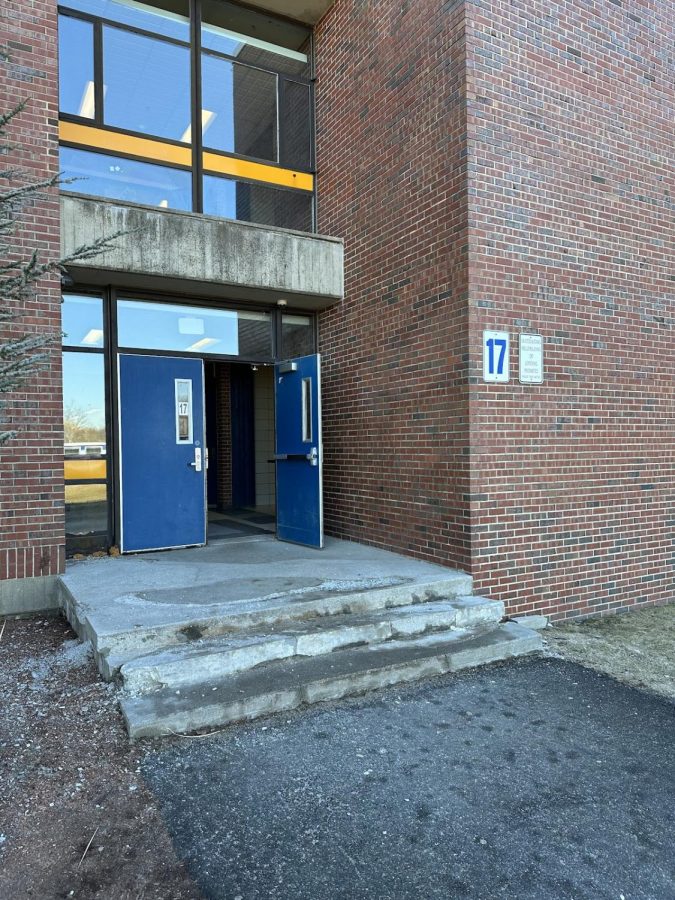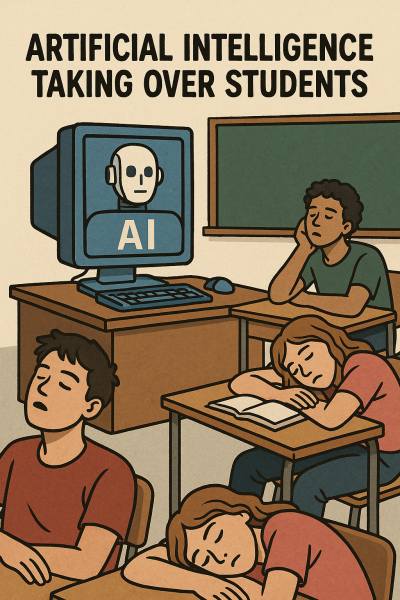Triton Security Addressed
How Easy is it to Gain Access Into Triton High School
Door 17, back entrance to Triton High School, is propped open, making easy access for a potential intruder (Szymanski photo).
By Sadie Clifford and Aiden Szymanski
Staff Writers
As a student at Triton, finding a way into the school building isn’t difficult.
Many opportunities are available, including open doors, door seventeen by the outbuilding and science hallway, and friends propping doors open. All of these possibilities are also major security concerns. Door seven by the gym is frequently propped open by students during their classes. Officer John Lucey spoke about how students have to be more careful about doing this for safety reasons.
“If someone is trying to find a way to sneak in and that door is propped, you’re basically giving them an in,” Lucey said.
Students have also expressed concern over door seventeen, the door by the science hallway which stays unlocked throughout the school day. Students often gain access into the building through this door after parking in the back lot, or having class outside in the outbound buildings or on the field. The problem with keeping this door unlocked all day is apparent, but the noticeable issue with students needing to utilize it often is what seems to be at stake.
Door seventeen can also be found propped open often. Either for a flow of air through the hall or easier access for students coming and going, it occasionally remains open for some parts of the day. Adam Lothrop, a teacher at Triton whose classroom is located beside door seventeen, understands the practicality of having that door unlocked but offered a solution to the potential safety issues it presents in a recent interview.
“It would be really nice if we had confirmation or ability to immediately lock it, where there’d be a security issue, and not have to wait for somebody to come down and handle it,” said Lothrop.
Principal Patrick Kelley mentioned that door seventeen is a priority area that is in the process of being addressed. Parts are arriving this week that will ensure that door seventeen will remain locked during the day, but will unlock during passing periods. Brayden Lopes, a sophomore at Triton, recounted a story of using an unlocked door seventeen to gain access into the building after school hours.
“I think it was a late practice and the tunnel door was locked, and I ran over to the high school back entrance, like over to Hounam’s room, and I opened up a door that was unlocked for some reason. I don’t know why it was unlocked, but it was unlocked at six o’clock,” said Lopes.
Students letting outsiders into the building from the inside is also an ongoing issue. This can commonly be seen by the side door leading into the cafeteria, door sixteen, and the other door connecting to the cafeteria, door fifteen. Students who have class in the outbound classrooms look to gain entry into the cafeteria from the outside using these doors.
When conducting an experiment on how difficult it is to get into the building, Triton Voice reporters were let into the cafeteria through door sixteen by students after they had knocked.
“…Students need to make sure that they are leaving [letting people into the building] to the administrative assistants who let people in the building so we can get proper verification that someone is supposed to be here,” said Assistant Principal Joseph Celia.
Without that verification, there is no telling who could have entered the building. Students who let people into the building that aren’t a part of the student body or faculty at Triton, which isn’t encouraged, are providing another opportunity for people to enter the building easily. With this being evident, anyone could be entering the building. Although students know the concern surrounding letting unknown people inside, it is not uncommon.
Another concern is the fact that Triton is an open-campus to residents. Byfield citizens are often seen on the campus grounds walking the track, walking on the field, and walking elsewhere on campus, occasionally with dogs and babies. When plans to build the new stadium were finalized, it was agreed upon that the community would be able to use it.
“I personally don’t think it’s a great idea during school hours,” Lucey said. “Aside from just school safety, it’s a distraction and there are minor safety issues. If someone is running on the track while there is a gym class outside, it’s inappropriate.”
Aside from the presence of the locals, there is also the worry about who these people are. During an interview with Triton Voice reporters, students had said that the unsettling feeling that anyone could walk around freely on Triton’s campus is often present. If someone were trying to get into the building, there wouldn’t be any concern until they are actually inside. Kelley acknowledges the security threat this presents and stated in a recent interview that this policy could be changed in the future.
“I would prefer not to have people on the campus during the day that are not Triton students or staff,” said Kelley, who feels there is a possibility that a recommendation is put forth for the policy to change, and that the lack of background checks for people utilizing the space creates a security concern.
Overall, students and staff must put greater emphasis on adhering to basic protocols to ensure that Triton remains a safe environment.
“We all need to work together to make sure that we’re not propping doors or holding the door for our friends and we’re not sneaking out of the building through other doors. Some of these doors, you know you exit out and you think the door closed behind you and it didn’t,” Lucey said. He and many others could agree that the students at Triton need a mentality switch in regards to school safety and making smart decisions. Sneaking out during school hours could create serious consequences if a door doesn’t shut properly. Some others feel students and staff should learn to protect themselves.
“I think everybody should train in the martial arts,” said an anonymous faculty member at Triton. “Somebody tries to infiltrate, you karate-chop them.”

Hi! My name is Sadie Clifford. I’m a junior at Triton High School. Most of my free time is occupied by my two jobs, homework, and writing. Additionally,...

My name is Aiden Szymanski. I am a junior at Triton High School and a staff writer for the Triton Voice.
Outside of school, I keep myself busy with...







